
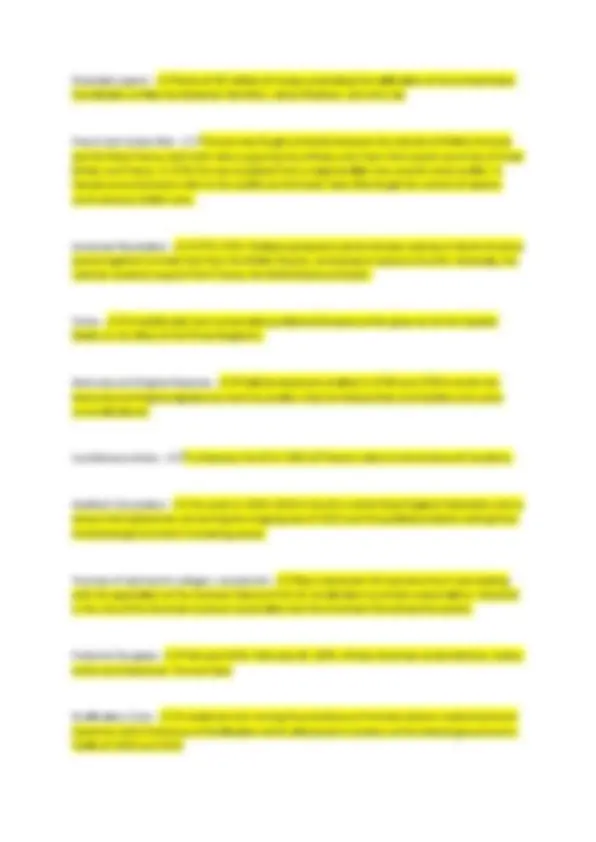
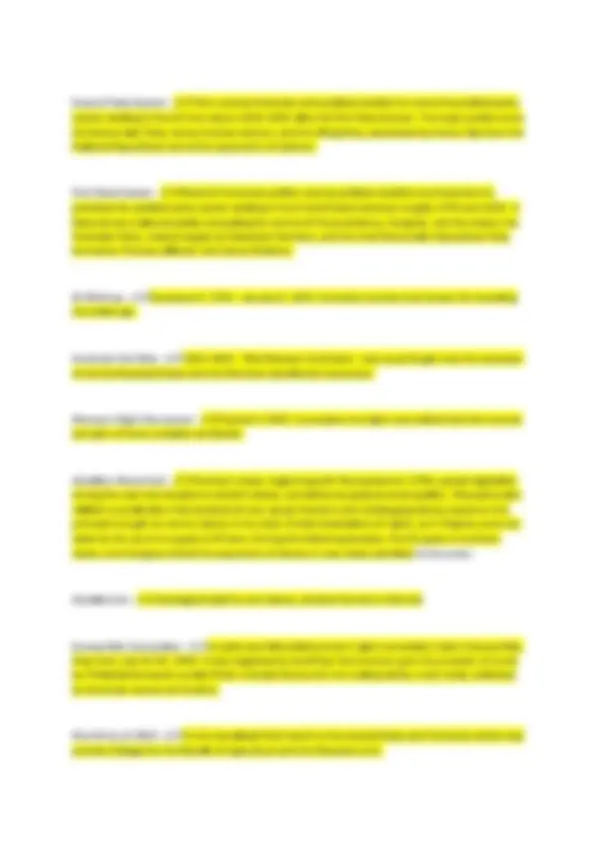
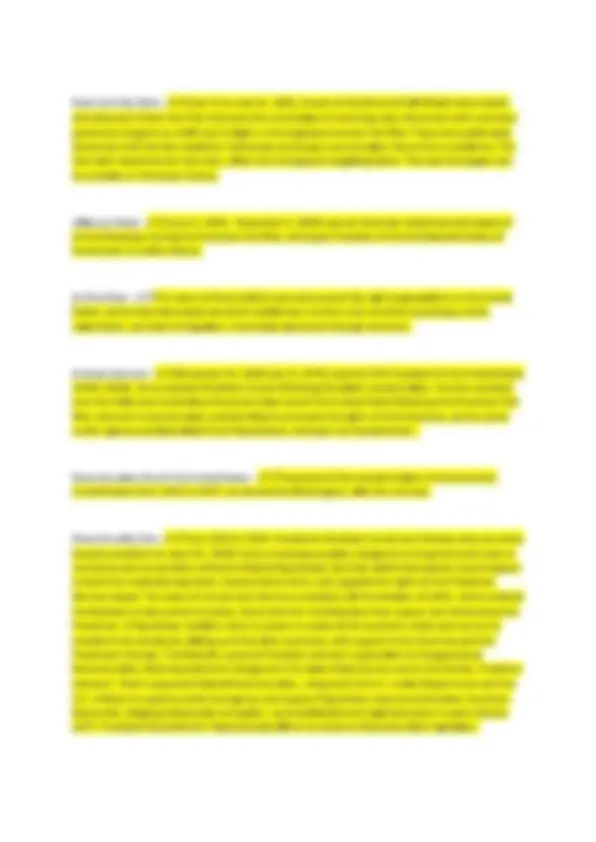
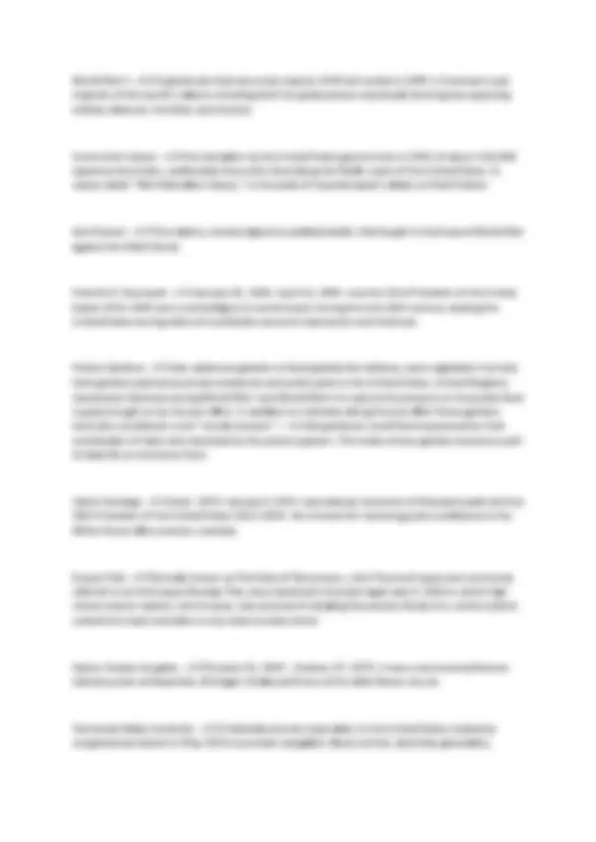
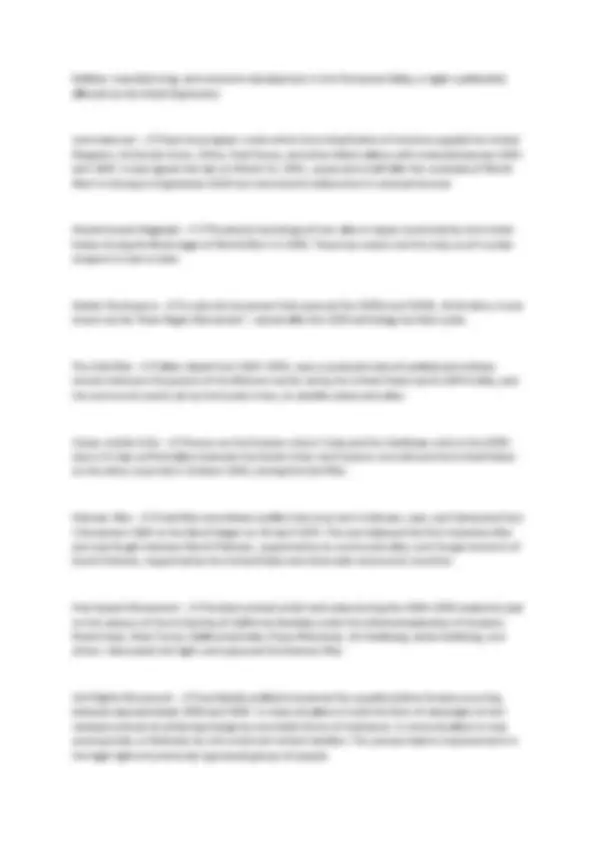
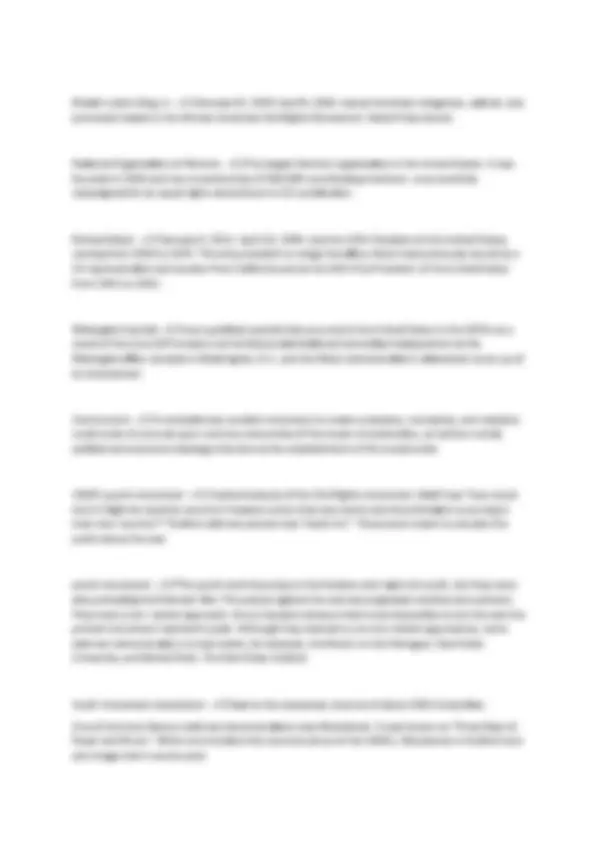
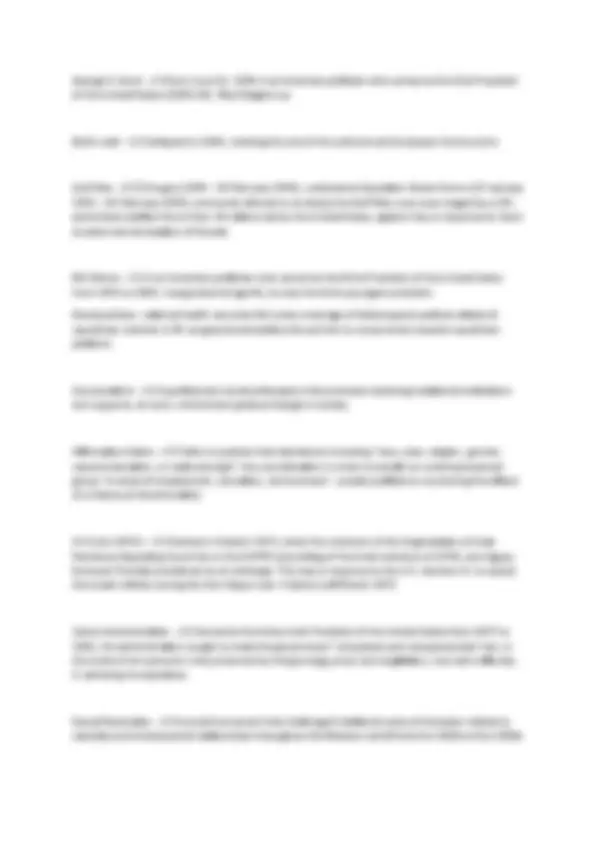
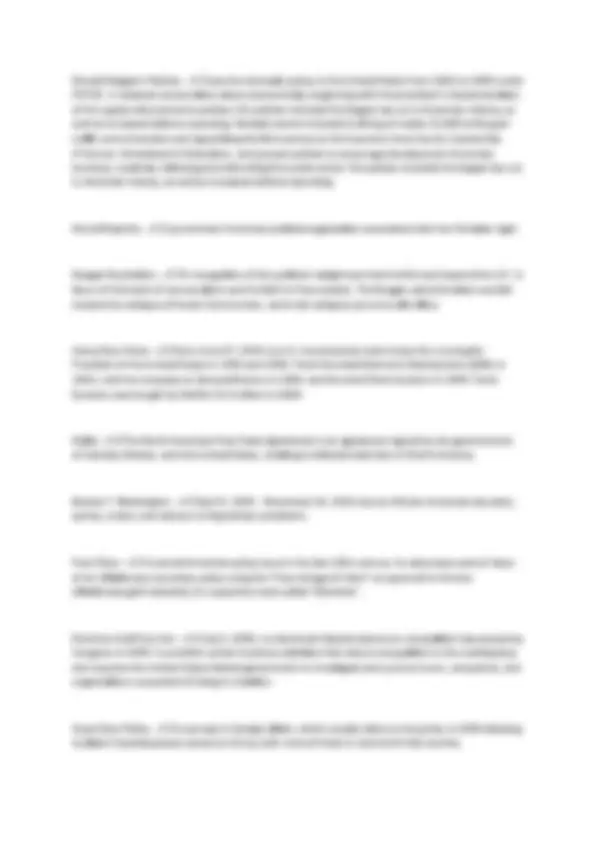
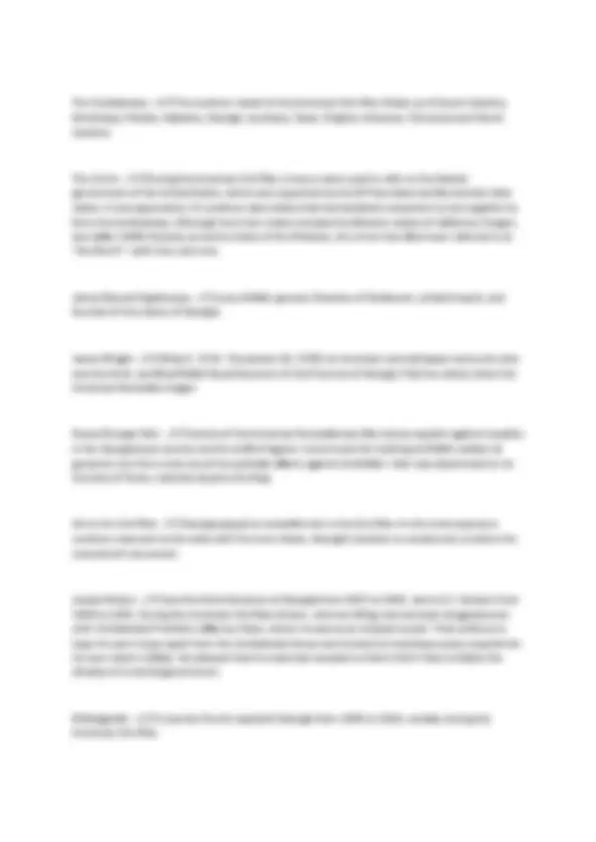
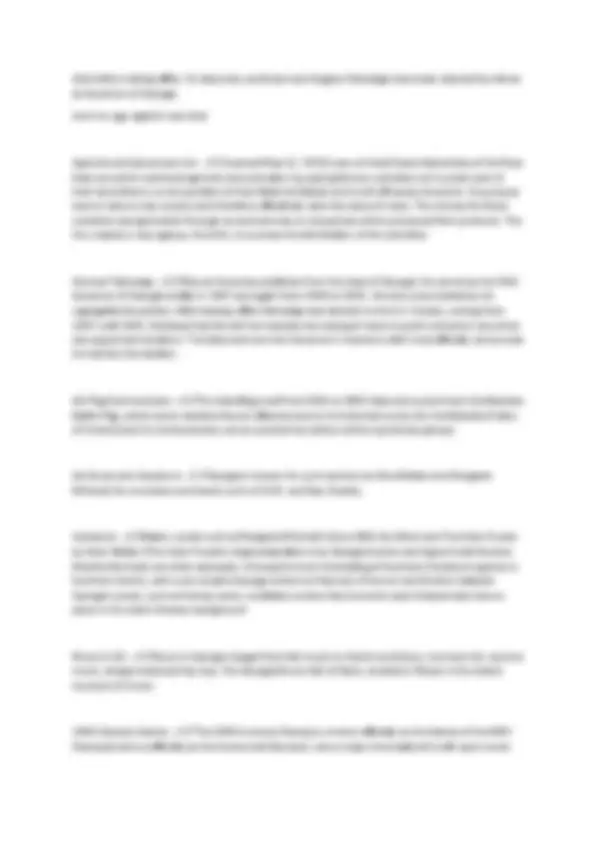
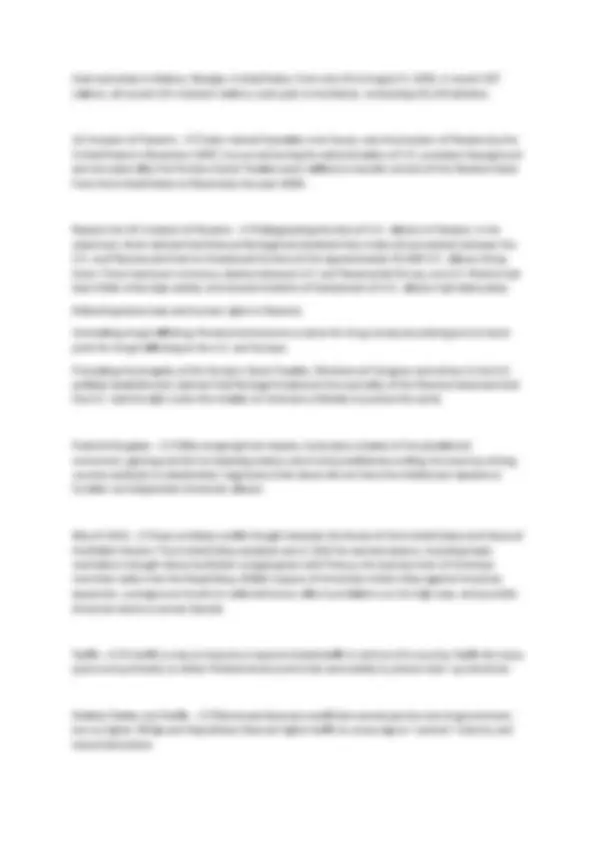
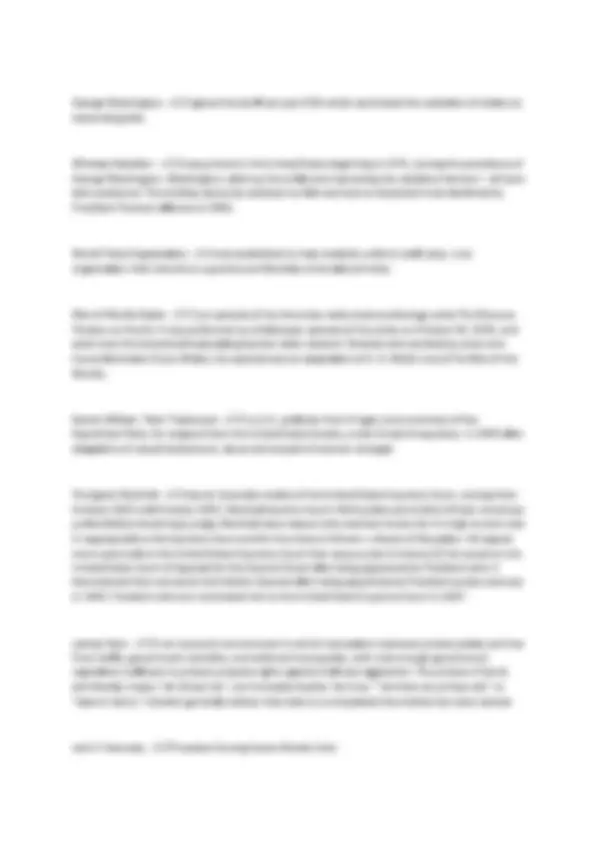
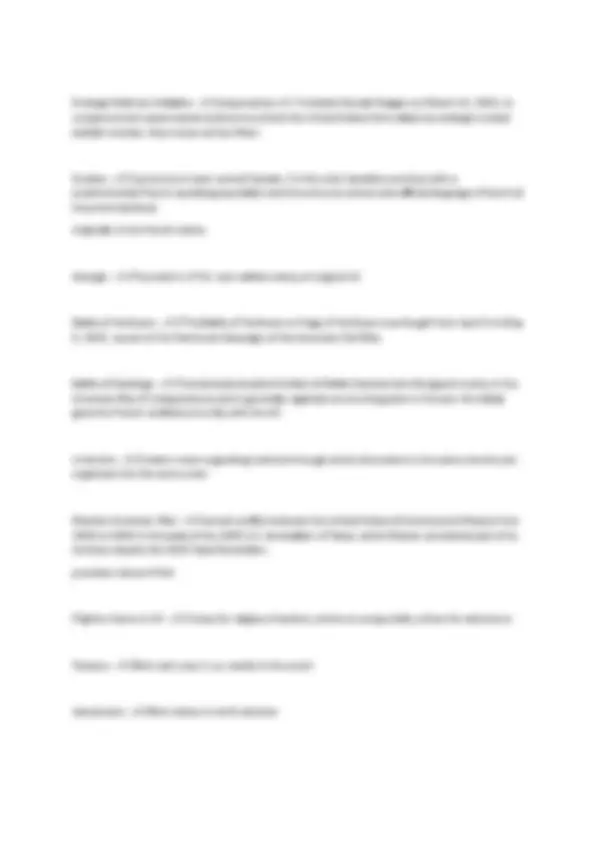
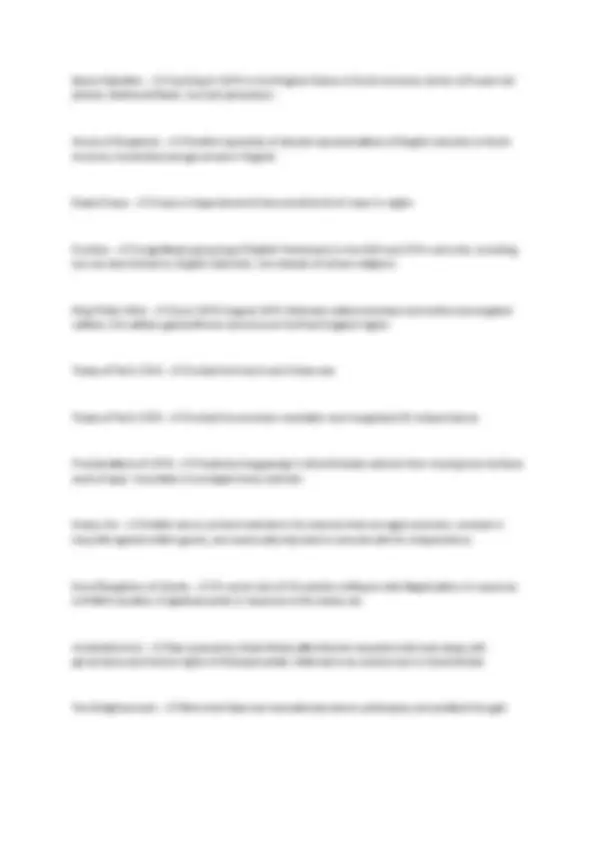
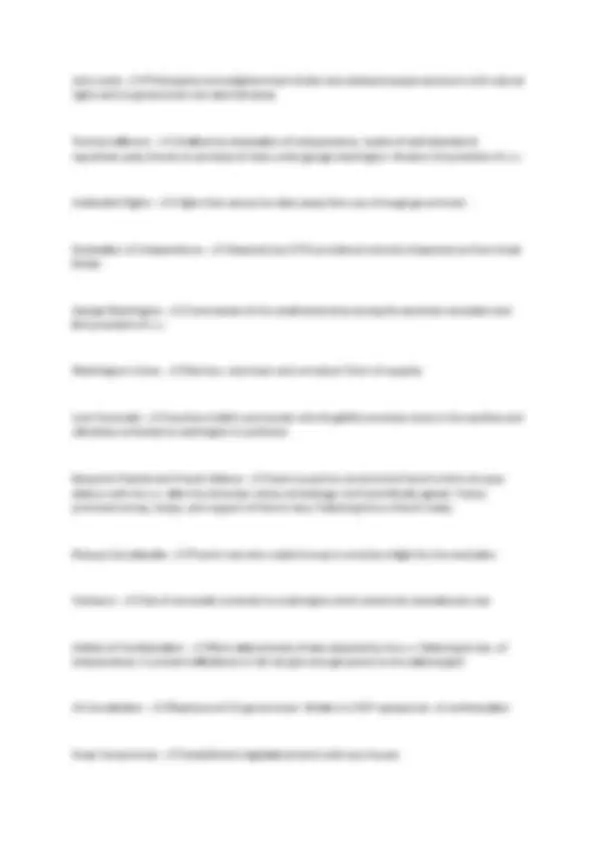
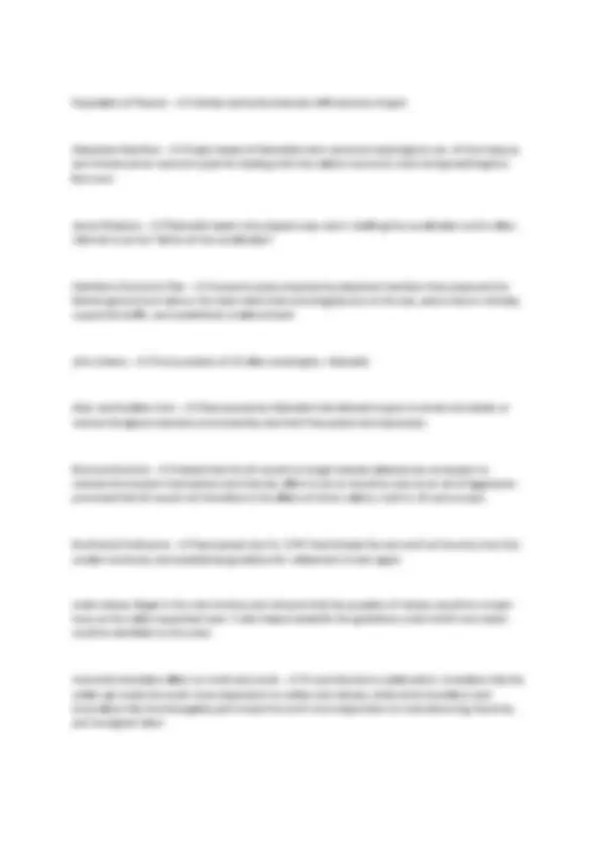

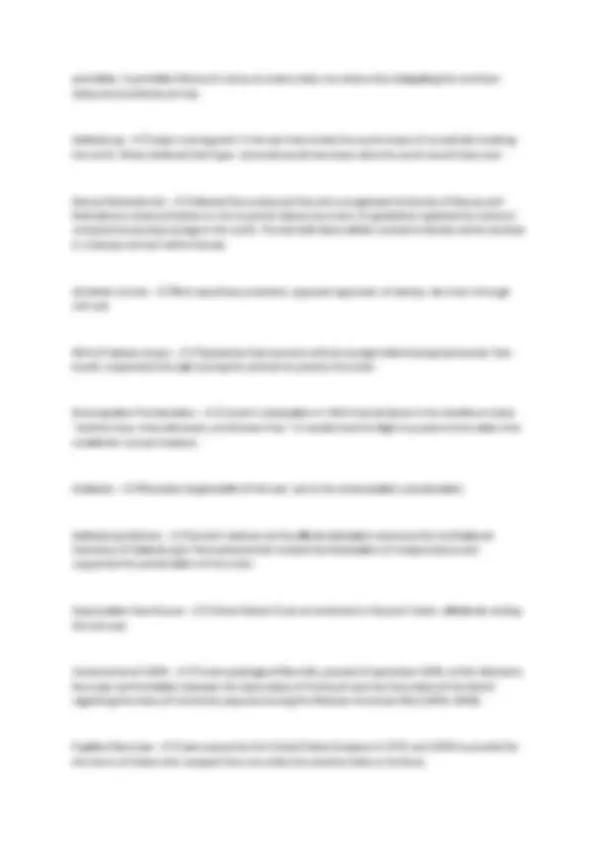
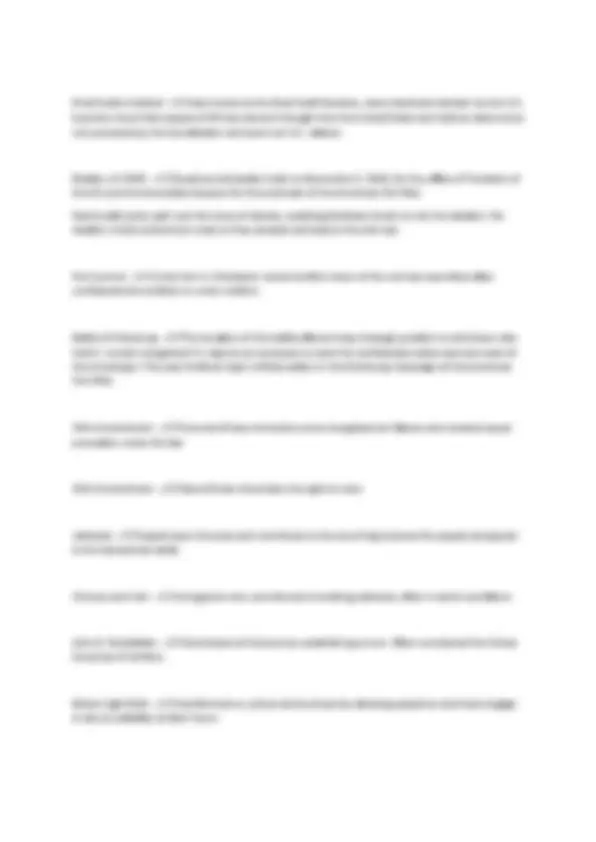
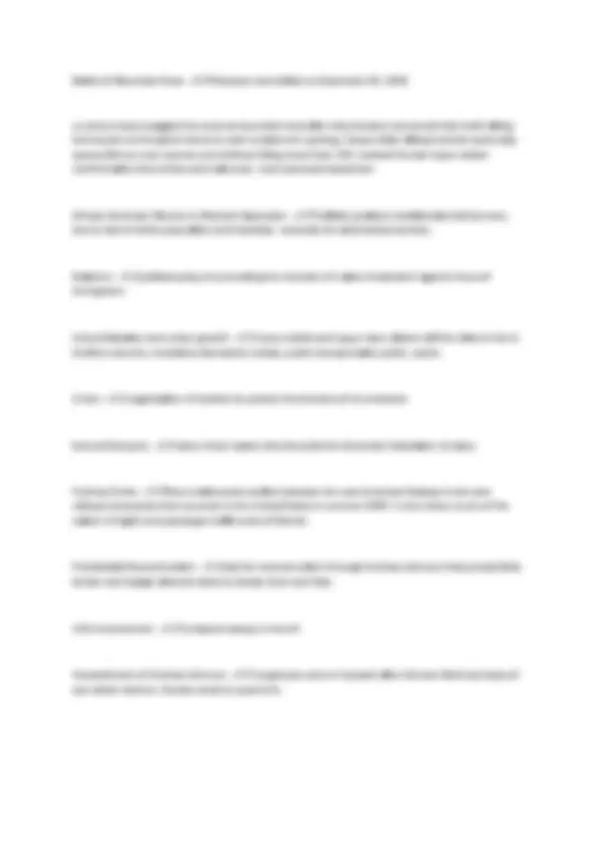
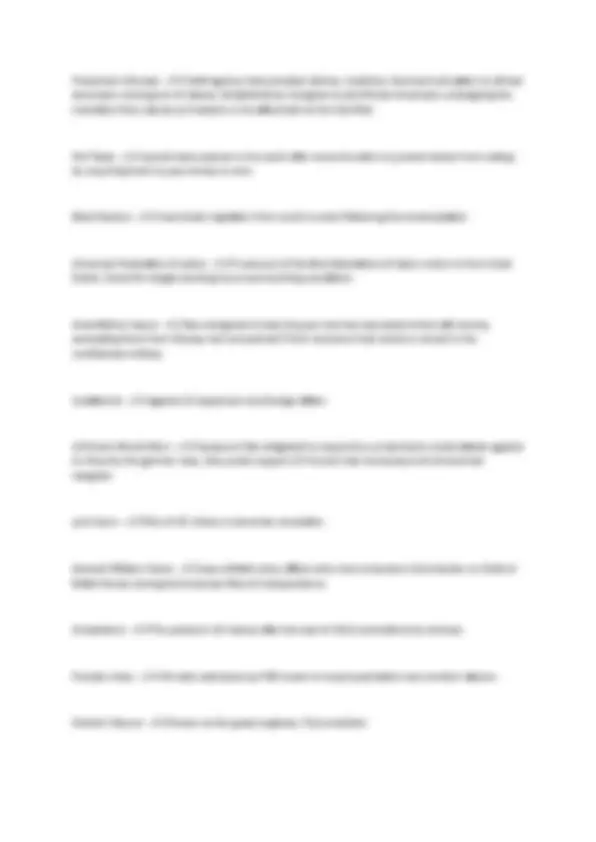
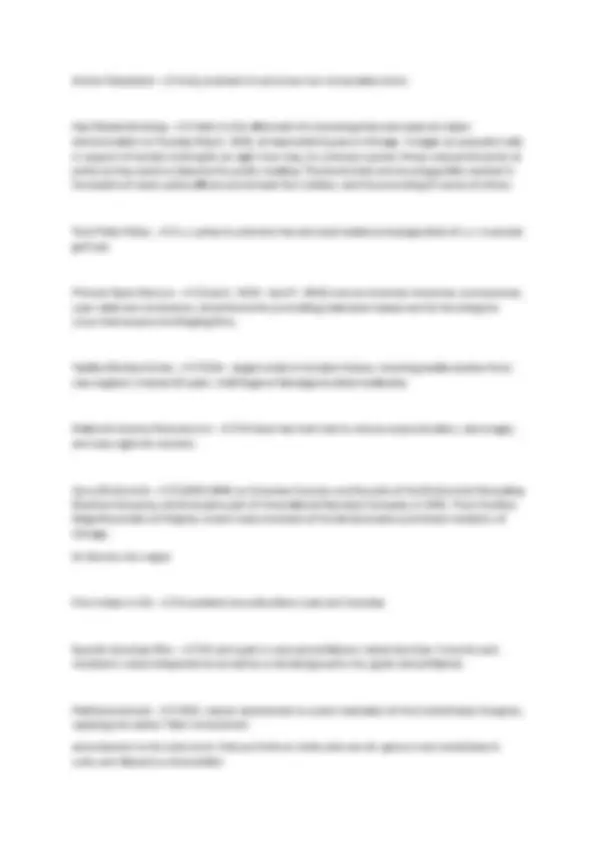
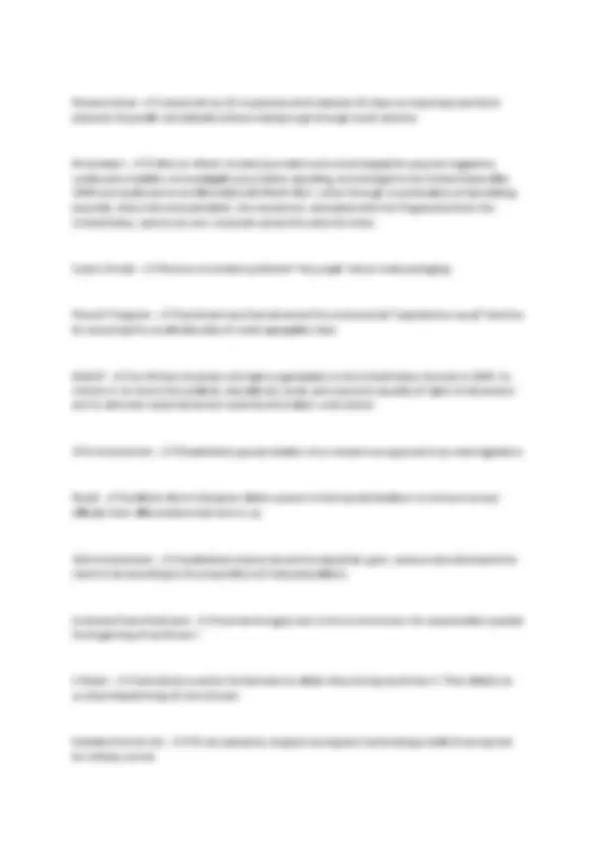
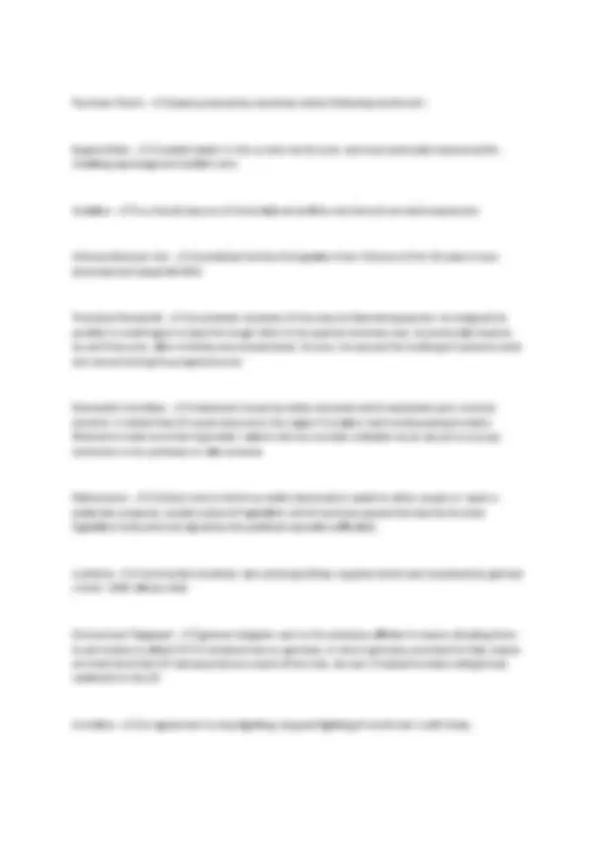
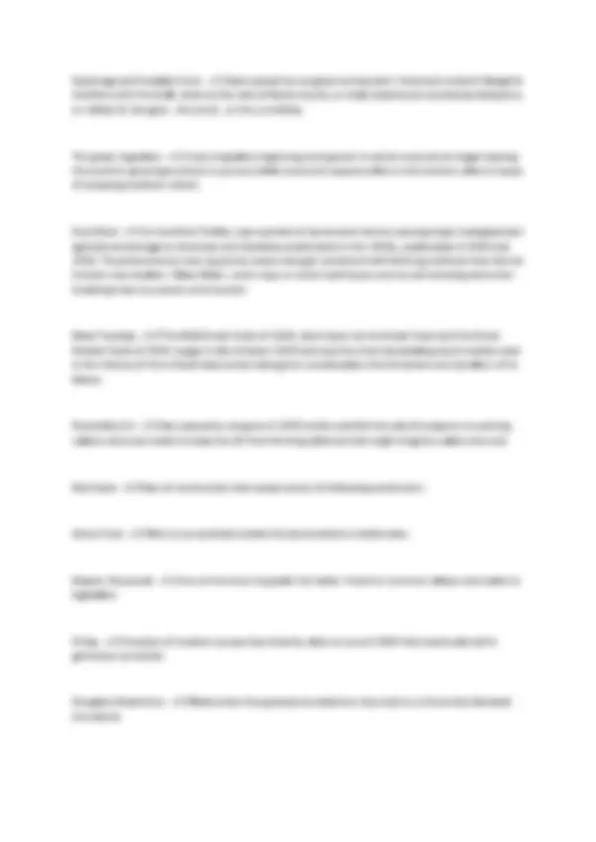

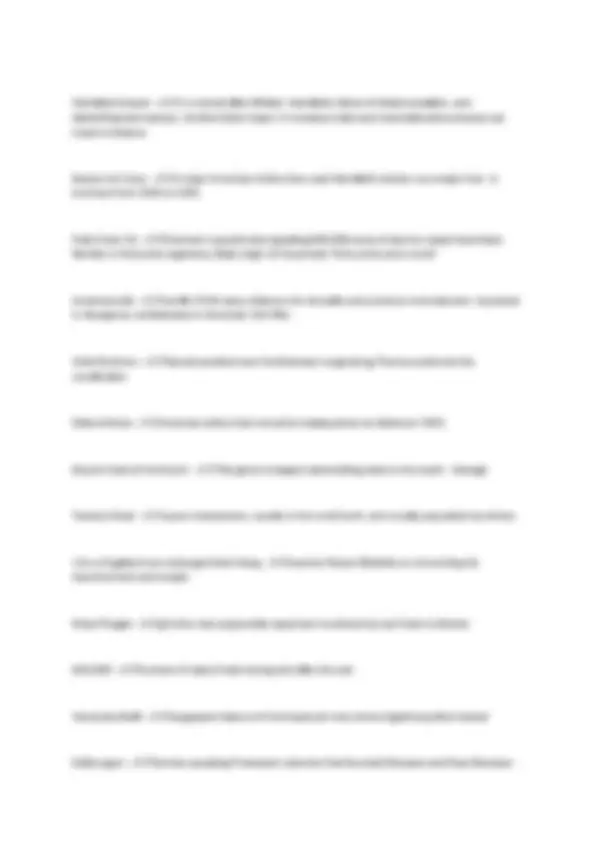


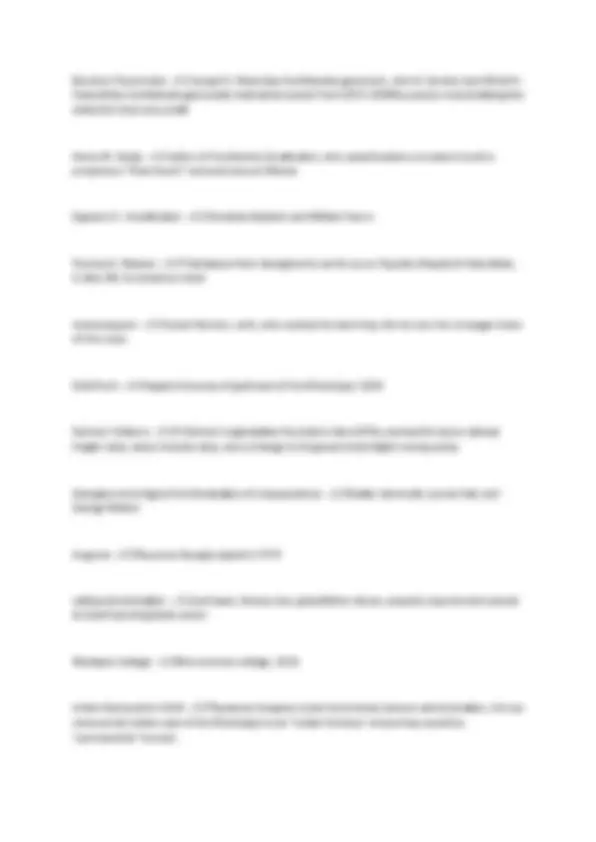



Study with the several resources on Docsity

Earn points by helping other students or get them with a premium plan


Prepare for your exams
Study with the several resources on Docsity

Earn points to download
Earn points by helping other students or get them with a premium plan
Community
Ask the community for help and clear up your study doubts
Discover the best universities in your country according to Docsity users
Free resources
Download our free guides on studying techniques, anxiety management strategies, and thesis advice from Docsity tutors
Iroquois League - ✔✔Known as the Haudenosaunee or the "People of the Longhouse", this is a league of several nations and tribes of indigenous people of North America Yazoo Lands - ✔✔The sparsely-populated central and western areas of the US state of GA, when its western border stretched to the Mississippi River. James Jackson - ✔✔October 18, 1819 - January 13, 1887. It was a US representative from GA, a judge advocate during the American Civil War, and a chief justice of the Supreme Court of Georgia. He nullified the yazoo sale and destroyed records connected with the state. Later the Yazoo lands were given to the Federal Government
Typology: Exams
1 / 39

This page cannot be seen from the preview
Don't miss anything!
































Iroquois League - ✔✔Known as the Haudenosaunee or the "People of the Longhouse", this is a league of several nations and tribes of indigenous people of North America Yazoo Lands - ✔✔The sparsely-populated central and western areas of the US state of GA, when its western border stretched to the Mississippi River. James Jackson - ✔✔October 18, 1819 - January 13, 1887. It was a US representative from GA, a judge advocate during the American Civil War, and a chief justice of the Supreme Court of Georgia. He nullified the yazoo sale and destroyed records connected with the state. Later the Yazoo lands were given to the Federal Government. Yazoo Land Fraud - ✔✔A massive fraud perpetrated from 1794-1803 by several Georgia governers and the state legislature. It involved the selling of unsettled Georgia territory to four large companies and the eventual resale to the US federal government after cries of bribery and corruption led James Jackson to rescind the original sale. James Gunn - ✔✔Georgia's US senator who arranged the distribution of money and Yazoo land to legislators, state officials, newspaper editors and other influential people. Trail of Tears - ✔✔The forced relocation and movement of Native American nations from southeastern parts of the US following the Indian Removal Act of 1830. The removal sent many members of the Cherokee, Muscogee, Seminole, Chickasaw and Choctaw nations, among others in the US, from their homelands to Indian territory (From Georgia to Oklahoma.) Hernan Cortes - ✔✔The 1st Marquis of the Valley of Oaxaca, (1485 - December 2, 1547) was a Spanish Conquistador who led an expedition that caused the fall of the Aztec Empire and brought large portions of mainland Mexico under the rule of the King of Castile in the early 16th Century. The Stono Rebellion - ✔✔A slave rebellion that commenced on September 9 1739, in the colony of South Carolina where armed slaves marched towards Spanish Florida. It was the largest slave uprising in the British mainland colonies prior to the American Revolution.
Jemmy AKA "Cato" - ✔✔A literate slave who staged and led the Stono Rebellion William Penn - ✔✔October 14, 1644 - July 30 1718. It was an English real estate entrepreneur, philosopher and founder of the Province of Pennsylvania, the English North American colony and the future Commonwealth of Pennsylvania The Great Awakening - ✔✔Used to refer to several periods of religious revival in American history. Historians and theologians identify three or four waves of increased religious enthusiasm occurring between the early 18th and late 19th century. Each of these was characterized by widespread revivals lead by evangelical Protestant ministers, a sharp increase of interest in religion, a profound sense of conviction and redemption on the part of those affected, an increase in evangelical church membership and the formation of new religious movements and denominations. Indentured Servitude - ✔✔Historical practice of contracting to work for a fixed period of time, typically 3 to 7 years in exchange for transportation, food, clothing lodging and other necessities during the term of indenture. Quakers - ✔✔Members of the Religious Society of friends. Came to North America from 1656 onwards because they wanted to spread their beliefs to the British colonists there, while others came to escape the persecution that they were experiencing in Europe. The colony of Rhode Island with its policy of religious freedom was a frequent destination as the Friends were persecuted by law in Massachusetts until 1681. Pennsylvania was formed by William Penn in 1681 as a haven for those persecuted. Mercantilism - ✔✔the economic doctrine designed to maximize the benefits of trade of a nation and historically, accumulation of gold and silver. It promotes governmental regulation of a nation's economy for the purpose of augmenting state power at the expense of rival national powers. Thomas Paine - ✔✔English-American political activist, author, political theorist and revolutionary. As the author or two highly influential pamphlets at the start of the American Revolution, he became one of the Founding Fathers of the United States. He has been called "a corsetmaker by trade, a journalist by profession, and a propagandist by inclination." Alexander Hamilton - ✔✔(January 11, 1755 or 177 - July 12, 1804) was a Founding Father, soldier, economist, political philosopher, one of Amrica's first constitutional lawyers and the first US Secretary of the Treasury.
Second Party System - ✔✔Term used by historians and political scientists to name the political party system existing in the US from about 1828-1854 after the First Party System. The major parties were the Democratic Party, led by Andrew Jackson, and the Whig Party, assembled by Henry Clay from the National Republicans and other opponents of Jackson. First Party System - ✔✔Model of American politics used by political scientists and historians to periodize the political party system existing in the United States between roughly 1792 and 1824. It featured two national parties competing for control of the presidency, Congress, and the states: the Federalist Party, created largely by Alexander Hamilton, and the rival Democratic-Republican Party formed by Thomas Jefferson and James Madison. Eli Whitney - ✔✔December 8, 1765 - January 8, 1825. American inventor best known for inventing the cotton gin. American Civil War - ✔✔ 1861 - 1865. "War Between the States", was a war fought over the secession of the Confederate States and the Northern abolitionist movement. Women's Right Movement - ✔✔Started in 1848. It proclaims the rights and entitlements for women and girls of many societies worldwide. Abolition Movement - ✔✔Northern states, beginning with Pennsylvania in 1780, passed legislation during the next two decades to abolish slavery, sometimes by gradual emancipation. Massachusetts ratified a constitution that declared all men equal; freedom suits challenging slavery based on this principle brought an end to slavery in the state. Similar declarations of rights, as in Virginia, were not taken by the courts to apply to Africans. During the following decades, the this grew in northern states, and Congress limited the expansion of slavery in new states admitted to the union. Abolitionism - ✔✔Ideological belief to end slavery, whether formal or informal. Seneca Falls Convention - ✔✔an early and influential women's rights convention held in Seneca Falls, New York, July 19-20, 1848. It was organized by local New York women upon the occasion of a visit by Philadelphia-based Lucretia Mott, a Quaker famous for her orating ability, a skill rarely cultivated by American women at the time. Morrill Act of 1862 - ✔✔An Act donating Public Lands to the several States and Territories which may provide Colleges for the Benefit of Agriculture and the Mechanic Arts.
New York City Riots - ✔✔(July 13 to July 16, 1863; known at the time as Draft Week) were violent disturbances in New York City that were the culmination of working-class discontent with new laws passed by Congress to draft men to fight in the ongoing American Civil War. They were particularly discontent with the fact wealthier individuals could pay a commutation fee to hire a substitute. The riots later devolved into race riots, often Irish immigrants targeting blacks. This was the largest civil insurrection in American history. Jefferson Davis - ✔✔(June 3, 1808 - December 6, 1889) was an American statesman and leader of the Confederacy during the American Civil War, serving as President of the Confederate States of America for its entire history. Ku Klux Klan - ✔✔The name of three distinct past and present far-right organizations in the United States, which have advocated extremist reactionary currents such as white supremacy, white nationalism, and anti-immigration, historically expressed through terrorism. Andrew Johnson - ✔✔(December 29, 1808 July 31, 1875) was the 17th President of the United States (1865-1869). He succeeded Abraham Lincoln following the latter's assassination. He then presided over the initial and contentious Reconstruction era of the United States following the American Civil War. Johnson's reconstruction policies failed to promote the rights of the Freedmen, and he came under vigorous political attack from Republicans, ending in his impeachment.. Reconstruction Era of the United States - ✔✔The period of the transformation of the Southern United States from 1863 to 1877, as directed by Washington, after the civil war. Reconstruction Era - ✔✔From 1863 to 1869, Presidents Abraham Lincoln and Andrew Johnson (who became president on April 14, 1865) took a moderate position designed to bring the South back to normal as soon as possible, while the Radical Republicans (as they called themselves) used Congress to block the moderate approach, impose harsh terms, and upgrade the rights of the Freedmen (former slaves). The views of Lincoln and Johnson prevailed until the election of 1866, which enabled the Radicals to take control of policy, remove former Confederates from power, and enfranchise the Freedmen. A Republican coalition came to power in nearly all the southern states and set out to transform the society by setting up a free labor economy, with support from the Army and the Freedman's Bureau. The Radicals, upset at President Johnson's opposition to Congressional Reconstruction, filed impeachment charges but the action failed by one vote in the Senate. President Ulysses S. Grant supported Radical Reconstruction, using both the U.S. Justice Department and the U.S. military to suppress white insurgency and support Republican reconstructed states. Southern Democrats, alleging widespread corruption, counterattacked and regained power in each state by
League of Nations - ✔✔international organization proposed by president Woodrow Wilson and established by the Treaty of Versailles after World War I which was intended to provide a place where countries could peacefully discuss solutions to their difference rather than go to war. Federalist Party - ✔✔considered the first American political party. It advocated a strong national government, and included John Adams and Alexander Hamilton. Whig Party - ✔✔Emerged in the 1830s as the leading opponent of Jacksonians, pulling together former members of the National Republicans and the Anti-Masonic Party. Appealed especially to professional class citizens and elected President's William Henry Harrison, John Tyler, Zachary Taylor and Millard Fillmore. Progressive Party - ✔✔A third party in the United States formed in 1912 by former President Theodore Roosevelt after he lost the presidential nomination of the Republican Party. Supported reforms such as women's suffrage, an 8-hour workday and a social insurance system. Populist Party - ✔✔A political party in the United States between 1984 and 1996. It was far-right and often white nationalist in its ideology. Ran the KKK leader, David Duke for president in 1988. Mugwump Party - ✔✔A party of Republican political activists who bolted from the United States Republican Party by supporting Democratic candidate Grover Cleveland in the United States presidential election of 1884. They switched parties because they rejected the financial corruption associated with Republican candidate James G. Blaine. In a close election, the party supposedly made the difference in New York state and swung the election to Cleveland. New Deal - ✔✔A series of economic programs enacted in the United States between 1933 and 1936 meant to act as a stimulus to the US economy. They involved presidential executive orders or laws passed by Congress during the first term of President Franklin D Roosevelt. Great Depression - ✔✔Depression varied across nations, but in most countries it started in 1930 after the passage of the United States' Smoot-Hawley Tariff bill (June 17), and lasted until the late 1930s or middle 1940s. It was the longest, most widespread, and deepest depression of the 20th century.
World War II - ✔✔A global war that was under way by 1939 and ended in 1945. It involved a vast majority of the world's nations-including all of the great powers-eventually forming two opposing military alliances: the Allies and the Axis. Internment Camps - ✔✔the relocation by the United States government in 1942 of about 110, Japanese Americans. particularly those who lived along the Pacific coast of the United States, to camps called "War Relocation Camps," in the wake of Imperial Japan's attack on Pearl Harbor. Axis Powers - ✔✔The nations, mostly aligned in political beliefs, that fought in the Second World War against the Allied forces. Franklin D. Roosevelt - ✔✔January 30, 1882- April 12, 1945. was the 32nd President of the United States 1933-1945 and a central figure in world events during the mid-20th century, leading the United States during a time of worldwide economic depression and total war. Victory Gardens - ✔✔also called war gardens or food gardens for defense, were vegetable, fruit and herb gardens planted at private residences and public parks in the United States, United Kingdom, Canada and Germany during World War I and World War II to reduce the pressure on the public food supply brought on by the war effort. In addition to indirectly aiding the war effort these gardens were also considered a civil "morale booster" — in that gardeners could feel empowered by their contribution of labor and rewarded by the produce grown. This made victory gardens become a part of daily life on the home front. Calvin Coolidge - ✔✔July 4, 1872- January 5, 1933. was a lawyer, Governor of Massachusetts and the 30th President of the United States 1923-1929. He is known for restoring public confidence in the White House after previous scandals. Scopes Trial - ✔✔formally known as The State of Tennessee v. John Thomas Scopes and commonly referred to as the Scopes Monkey Trial, was a landmark American legal case in 1925 in which high school science teacher, John Scopes, was accused of violating Tennessee's Butler Act, which made it unlawful to teach evolution in any state-funded school. Father Charles Coughlin - ✔✔October 25, 1891 - October 27, 1979. It was a controversial Roman Catholic priest at Royal Oak, Michigan's National Shrine of the Little Flower church. Tennessee Valley Authority - ✔✔A federally owned corporation in the United States created by congressional charter in May 1933 to provide navigation, flood control, electricity generation,
Martin Luther King, Jr. - ✔✔January 15, 1929- April 4, 1968. was an American clergyman, activist, and prominent leader in the African-American Civil Rights Movement. Nobel Prize winner. National Organization of Women - ✔✔the largest feminist organization in the United States. It was founded in 1966 and has a membership of 500,000 contributing members. unsuccessfully campaigned for an equal rights amendment in US constitution. Richard Nixon - ✔✔January 9, 1913- April 22, 1994. was the 37th President of the United States, serving from 1969 to 1974. The only president to resign the office, Nixon had previously served as a US representative and senator from California and as the 36th Vice President of the United States from 1953 to 1961. Watergate Scandal - ✔✔was a political scandal that occurred in the United States in the 1970s as a result of the June 1972 break-in at the Democratic National Committee headquarters at the Watergate office complex in Washington, D.C., and the Nixon administration's attempted cover-up of its involvement. Communism - ✔✔a revolutionary socialist movement to create a classless, moneyless, and stateless social order structured upon common ownership of the means of production, as well as a social, political and economic ideology that aims at the establishment of this social order. 1960's youth movement - ✔✔started because of the Civil Rights movement. Belief was "how could the U.S fight for another country's freedom when their was racism and discrimination occurring in their own country?" The first anti-war protest was "teach-ins". These were meant to educate the public about the war. youth movement - ✔✔The youth were focusing on the freedom and rights of youth, but they were also protesting the Vietnam War. The protest against the war was organized marches and protests. They took a non- violent approach. Once it became obvious that it was impossible to win the war the protest movement reached its peak. Although they wanted to use non-violent approaches, some anti-war demonstration turned violent, for example, the March on the Pentagon, Kent State University, and Detroit Riots. The Kent State Incident Youth movement-woodstock - ✔✔lead to the temporary closures of about 500 Universities. One of the most famous anti-war demonstrations was Woodstock. It was known as "Three Days of Peace and Music." When one mentions the counterculture of the 1960's, Woodstock is the first term and image that is constructed.
Baby Boomers - ✔✔a person who was born during the demographic Post-World War II baby boom between the years 1946 and 1964, according to the U.S. Containment - ✔✔a United States policy using numerous strategies to prevent the spread of communism abroad. Brown V. Board of Education - ✔✔was a landmark United States Supreme Court case in which the Court declared state laws establishing separate public schools for black and white students unconstitutional. Malcolm X. - ✔✔May 19, 1925- February 21, 1965. was an African-American Muslim minister and human rights activist. John F. Kennedy - ✔✔May 29, 1917- November 22, 1963, was the 35th President of the United States, serving from 1961 until his assassination in 1963 Tet Offensive - ✔✔a military campaign during the Vietnam War that was launched on January 30, 1968 by forces of the People's Army of Vietnam against the forces of the Republic of Vietnam, the United States, and their allies. Kent State Shootings - ✔✔occurred at Kent State University in the U.S. city of Kent, Ohio, and involved the shooting of unarmed college students by the Ohio National Guard on Monday, May 4,
George H. Bush - ✔✔born June 12, 1924 is an American politician who served as the 41st President of the United States (1989-93). Was Reagans vp Berlin wall - ✔✔collapsed in 1989, marking the end of the cold war and European Communism Gulf War - ✔✔(2 August 1990 - 28 February 1991), codenamed Operation Desert Storm (17 January 1991 - 28 February 1991) commonly referred to as simply the Gulf War, was a war waged by a UN- authorized coalition force from 34 nations led by the United States, against Iraq in response to Iraq's invasion and annexation of Kuwait. Bill Clinton - ✔✔is an American politician who served as the 42nd President of the United States from 1993 to 2001. Inaugurated at age 46, he was the third-youngest president. liberal policies- national health care plan fell under a barrage of lobbying and partisan attacks & republican victories in 94 congressional elections forced him to compromise towards republican platform. Conservatism - ✔✔a political and social philosophy that promotes retaining traditional institutions and supports, at most, minimal and gradual change in society. Affirmative Action - ✔✔refers to policies that take factors including "race, color, religion, gender, sexual orientation, or national origin" into consideration in order to benefit an underrepresented group "in areas of employment, education, and business", usually justified as countering the effects of a history of discrimination. Oil Crisis 1970's - ✔✔started in October 1973, when the members of the Organization of Arab Petroleum Exporting Countries or the OAPEC (consisting of the Arab members of OPEC, plus Egypt, Syria and Tunisia) proclaimed an oil embargo. This was in response to the U.S. decision to re-supply the Israeli military during the Yom Kippur war. It lasted until March 1975 Carter Administration - ✔✔served as the thirty-ninth President of the United States from 1977 to
Ronald Reagan's Policies - ✔✔was the domestic policy in the United States from 1981 to 1989 under POTUS. It retained conservative values economically, beginning with the president's implementation of his supply-side economic policies, His policies included the largest tax cut in American history, as well as increased defense spending. Notable events included his firing of nearly 12,000 striking air traffic control workers and appointing the first woman to the Supreme Court bench, Sandra Day O'Connor. He believed in federalism, and passed policies to encourage development of private business, routinely criticizing and defunding the public sector. His policies included the largest tax cut in American history, as well as increased defense spending Moral Majority - ✔✔a prominent American political organization associated with the Christian right. Reagan Revolution - ✔✔in recognition of the political realignment both within and beyond the U.S. in favor of his brand of conservatism and his faith in free markets. The Reagan administration worked toward the collapse of Soviet Communism, and it did collapse just as he left office. Henry Ross Perot - ✔✔born June 27, 1930 is a U.S. businessman best known for running for President of the United States in 1992 and 1996. Perot founded Electronic Data Systems (EDS) in 1962, sold the company to General Motors in 1984, and founded Perot Systems in 1988. Perot Systems was bought by Dell for $3.9 billion in 2009. Nafta - ✔✔The North American Free Trade Agreement is an agreement signed by the governments of Canada, Mexico, and the United States, creating a trilateral trade bloc in North America. Booker T. Washington - ✔✔April 5, 1856 - November 14, 1915 was an African-American educator, author, orator, and advisor to Republican presidents. Free SIlver - ✔✔a central American policy issue in the late 19th century. Its advocates were in favor of an inflationary monetary policy using the "free coinage of silver" as opposed to the less inflationary gold standard; its supporters were called "Silverites". Sherman Anti Trust Act - ✔✔July 2, 1890, is a landmark federal statute on competition law passed by Congress in 1890. It prohibits certain business activities that reduce competition in the marketplace, and requires the United States federal government to investigate and pursue trusts, companies, and organizations suspected of being in violation. Open Door Policy - ✔✔a concept in foreign affairs, which usually refers to the policy in 1899 allowing multiple Imperial powers access to China, with none of them in control of that country.
Henry L. Benning - ✔✔April 2, 1814 - July 10, 1875. Was a lawyer, legislator, judge on the Georgia Supreme Court, and a Confederate general during the American Civil War. He is also noted for the U.S. Army's fort named in his honor Robert Toombs - ✔✔Secretary of state, strong advocate for secession. A senator and extremist from Georgia who said that the South would never let the federal government be controlled by the Republican party and threatened secession. William T. Sherman - ✔✔He commanded the Union army in Tennessee. In September of 1864 his troops captured Atlanta, Georgia. He then headed to take Savannah. This was his famous "march to the sea.". His troops burned barns and houses, and destroyed the countryside. His march show ed a shift in the belief that only military targets should be destroyed. Civilian centers could also be targets. Crop Line System - ✔✔is a credit system that became widely used by farmers in the United States in the South from the 1860s to the 1920s. Rufus Bullock - ✔✔He served as the 46th Governor of Georgia from 1868 to 1871 during Reconstruction and was the first Republican governor of Georgia. After various allegations of scandal, in 1871 he was obliged by the Ku Klux Klan to resign the governorship Tunis Campbell - ✔✔prominent African American politician of the 19th century, and a major figure in Reconstruction Georgia. Born in Middlebrook, New Jersey, he served as a Justice of the Peace, a delegate to the State Constitutional Convention, and as a Georgia state senator. Died with a goal to help freedmen vote, he was appointed to the Board of Registration in Georgia. He was elected to congress as a senator in Georgia in 1868 only to be expelled from office because white congressmen agreed that blacks didn't have the right to hold office. He was able to return to office in 1871, but lost in 1872 and eventually imprisoned in a Georgia labor camp before fleeing the state. Republican State Senate president Benjamin Conley - ✔✔Succeeded Rufus Bullock. Served as Governor for the two remaining months of the term to which Bullock had been elected. He later became president of the Atlanta Chamber of Commerce and in 1895 served as master of ceremonies for the Cotton States and International Exposition Georgia Populism - ✔✔Led by the brilliant orator Thomas E. Watson, this new party mainly appealed to white farmers, many of whom had been impoverished by debt and low cotton prices in the 1880s and 1890s. Populism, which directly challenged the dominance of the Democratic Party, threatened to split the white vote in Georgia. Consequently, the Populists boldly tried to win black Republicans to their cause. Such appeals outraged Democrats and visited upon the state some of the most dramatic and bloody elections in its history
'New South' Crusade - ✔✔Sought to diversify the Georgia economy; eventually led to the industrialization of the state. W.E.B. Du Bois - ✔✔Rose to national prominence as the leader of the Niagara Movement, a group of African-American activists who wanted equal rights for blacks. He and his supporters opposed the Atlanta Compromise, an agreement crafted by Booker T. Washington which provided that Southern blacks would work and submit to white political rule, while Southern whites guaranteed that blacks would receive basic educational and economic opportunities. Instead, he insisted on full civil rights and increased political representation, which he believed would be brought about by the African- American intellectual elite. He referred to this group as the talented tenth and believed that African Americans needed the chances for advanced education to develop its leadership. Rebecca Latimer Felton - ✔✔June 10, 1835 - January 24, 1930 was an American writer, lecturer, reformer, and politician who became the first woman to serve in the United States Senate. She was the most prominent woman in Georgia in the Progressive Era, and was honored by appointment to the Senate; she was sworn in on November 21, 1922, and served one day, the shortest serving Senator in U.S. history. At 87 years old, 9 months and 22 days, she was also the oldest freshman senator to enter the Senate. As of 2012, she is also the only woman to have served as a Senator from Georgia. She was a prominent society woman; an advocate of prison reform, women's suffrage and educational modernization; and one of the few prominent women who spoke in favor of lynching. Leo Frank - ✔✔(April 17, 1884 - August 17, 1915) was a Jewish-American factory superintendent whose hanging in 1915 by a lynch mob, planned and led by prominent citizens in Marietta, Georgia, drew attention to antisemitism in the United States. He was the primary suspect in the murder and rape of Mary Phage, but never finished his trial. The County-Unit System - ✔✔was used by the U.S. state of Georgia to determine a victor in its primary elections. Each county was given a certain number of votes and the candidate who received the highest number of votes in that county won all their 'unit votes', under a form of block voting. A candidate had to have a majority of county unit votes to win and if no candidate received a majority, then a run-off election would be held between the top two finishers.In 1963, the county unit system was declared unconstitutional by the United States Supreme Court in its Gray v. Sanders decision. The Supreme Court found that the system violated the 'one man, one vote' principle. The Federal District Court for the District of North Georgia had previously enjoined the state from using the county unit system in the spring of 1962 and had instead instituted a statewide preferential primary. The gubernatorial primary was won by Sen. Carl Sanders over former Governor Marvin Griffin (a Talmadge-machine backed candidate). Eugene Talmadge - ✔✔was a Democratic politician who served two terms as the 67th Governor of Georgia from 1933 to 1937, and a third term from 1941 to 1943. Elected to a fourth term in 1946, he
that took place in Atlanta, Georgia, United States, from July 19 to August 4, 1996. A record 197 nations, all current IOC member nations, took part in the Games, comprising 10,318 athletes. US Invasion of Panama - ✔✔code-named Operation Just Cause, was the invasion of Panama by the United States in December 1989. It occurred during the administration of U.S. president George bush and ten years after the Torrijos-Carter Treaties were ratified to transfer control of the Panama Canal from the United States to Panama by the year 2000. Reasons for US Invasion of Panama - ✔✔Safeguarding the lives of U.S. citizens in Panama. In his statement, Bush claimed that Manuel Noriega had declared that a state of war existed between the U.S. and Panama and that he threatened the lives of the approximately 35,000 U.S. citizens living there. There had been numerous clashes between U.S. and Panamanian forces; one U.S. Marine had been killed a few days earlier, and several incidents of harassment of U.S. citizens had taken place. Defending democracy and human rights in Panama. Combating drug trafficking. Panama had become a center for drug money laundering and a transit point for drug trafficking to the U.S. and Europe. Protecting the integrity of the Torrijos-Carter Treaties. Members of Congress and others in the U.S. political establishment claimed that Noriega threatened the neutrality of the Panama Canal and that the U.S. had the right under the treaties to intervene militarily to protect the canal. Fredrick Douglass - ✔✔After escaping from slavery, he became a leader of the abolitionist movement, gaining note for his dazzling oratory and incisive antislavery writing. He stood as a living counter-example to slaveholders' arguments that slaves did not have the intellectual capacity to function as independent American citizens. War of 1812 - ✔✔was a military conflict fought between the forces of the United States and those of the British Empire. The United States declared war in 1812 for several reasons, including trade restrictions brought about by Britain's ongoing war with France, the impressment of American merchant sailors into the Royal Navy, British support of American Indian tribes against American expansion, outrage over insults to national honour after humiliations on the high seas, and possible American desire to annex Canada Tariffs - ✔✔A tariff is a tax on imports or exports (trade tariff) in and out of a country, Tariffs for many years were primarily to collect Federal revenue and only secondarily to protect start-up industries. Political Parties and Tariffs - ✔✔Democrats favored a tariff that would pay the cost of government, but no higher. Whigs and Republicans favored higher tariffs to encourage or "protect" industry and industrial workers
George Washington - ✔✔signed the tarriff act july 1789 which authorized the collection of duties on imported goods. Whiskey Rebellion - ✔✔a tax protest in the United States beginning in 1791, during the presidency of George Washington. Washington called up the militia and repressing the rebellious farmers—all were later pardoned. The whiskey excise tax collected so little and was so despised it was abolished by President Thomas Jefferson in 1802. World Trade Organization - ✔✔was established to help establish uniform tariff rates. is an organization that intends to supervise and liberalize international trade. War of Worlds Radio - ✔✔is an episode of the American radio drama anthology series The Mercury Theatre on the Air. It was performed as a Halloween episode of the series on October 30, 1938, and aired over the Columbia Broadcasting System radio network. Directed and narrated by actor and future filmmaker Orson Welles, the episode was an adaptation of H. G. Wells's novel The War of the Worlds. Robert William "Bob" Packwood - ✔✔is a U.S. politician from Oregon and a member of the Republican Party. He resigned from the United States Senate, under threat of expulsion, in 1995 after allegations of sexual harassment, abuse and assault of women emerged Thurgood Marshall - ✔✔was an Associate Justice of the United States Supreme Court, serving from October 1967 until October 1991. Marshall was the Court's 96th justice and its first African-American justice.Before becoming a judge, Marshall was a lawyer who was best known for his high success rate in arguing before the Supreme Court and for the victory in Brown v. Board of Education. He argued more cases before the United States Supreme Court than anyone else in history.[2] He served on the United States Court of Appeals for the Second Circuit after being appointed by President John F. Kennedy and then served as the Solicitor General after being appointed by President Lyndon Johnson in 1965. President Johnson nominated him to the United States Supreme Court in 1967. Laissez Faire - ✔✔is an economic environment in which transactions between private parties are free from tariffs, government subsidies, and enforced monopolies, with only enough government regulations sufficient to protect property rights against theft and aggression. The phrase is French and literally means "let [them] do", but it broadly implies "let it be," "let them do as they will," or "leave it alone." Scholars generally believe that state or a completely free market has never existed John F. Kennedy - ✔✔President During Cuban Missile Crisis